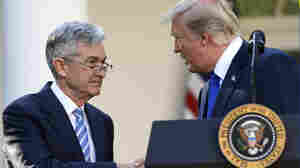

The Indicator from Planet Money
From NPR
A bite-sized show about big ideas. From the people who make Planet Money, The Indicator helps you make sense of what's happening in today's economy. It's a quick hit of insight into money, work, and business. Monday through Friday, in 10 minutes or less.
Most Recent Episodes
Workers on scaffolding lay blocks on one of the larger buildings at a development site where various residential units and commercial sites are under construction. Keith Srakocic/AP hide caption
(Saul Loeb / AFP via Getty) Saul Loeb/AFP via Getty Images hide caption
The Tesla robot is one of the many iterations looking to make headway as AI accelerates robotic development. AP Photo/J. Scott Applewhite hide caption
Acy Cooper, a Louisiana shrimper, on his fishing boat "The Lacy Kay." Drew Hawkins/Gulf States Newsroom hide caption









